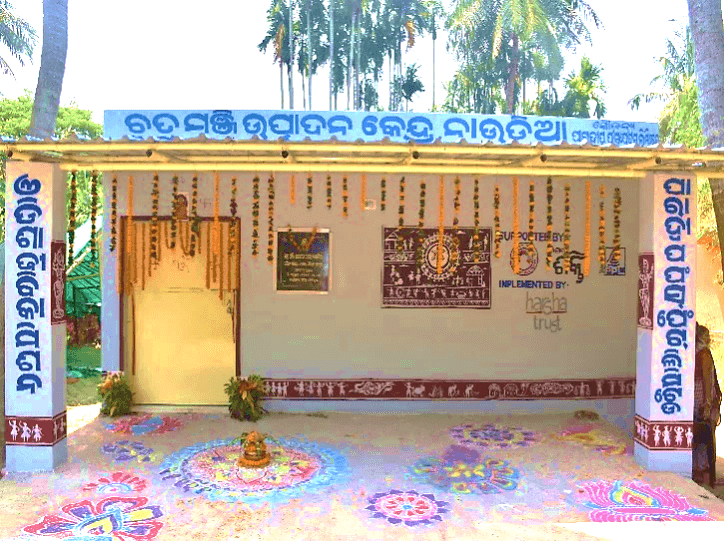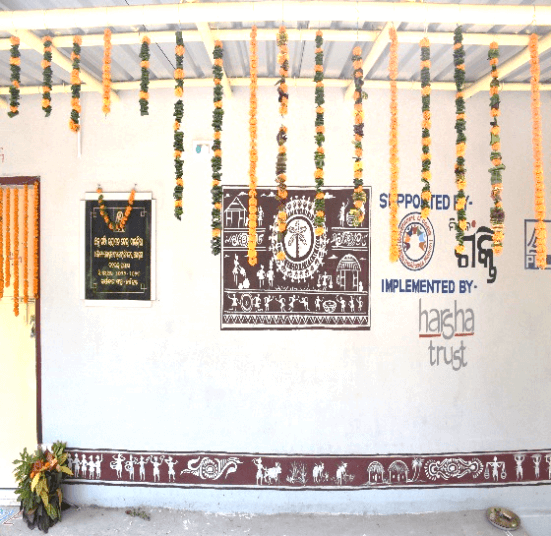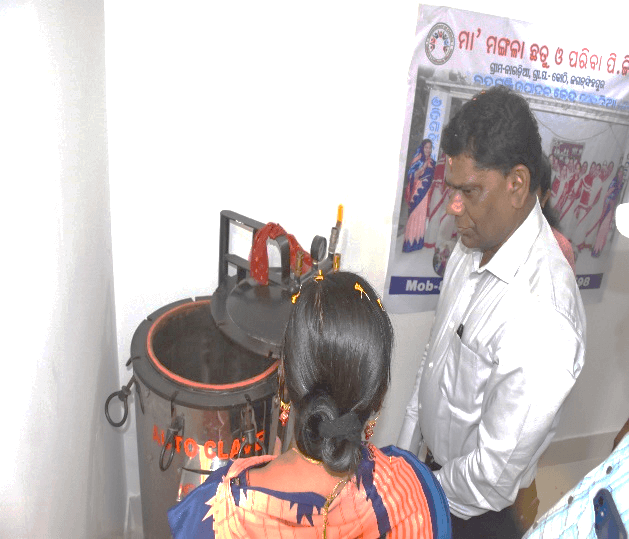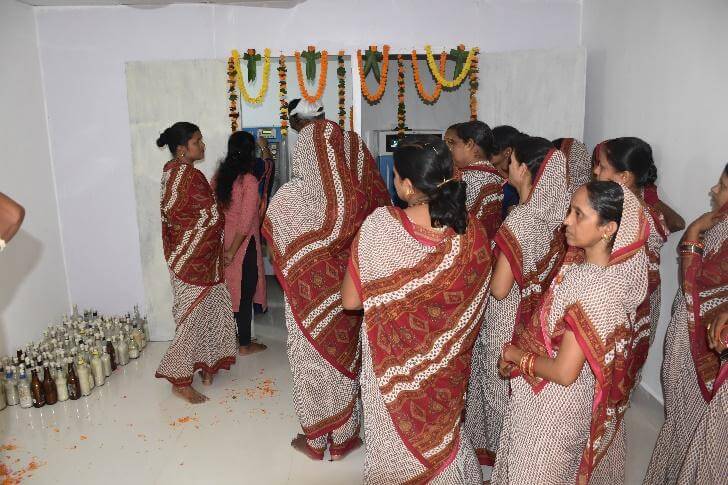Naudia is a hamlet under the Kothi Gram Panchayat of Kujanga Block of Jagatsinghpur District with 210 households. With an average land holding of 3 acres per household, people’s lives and livelihoods depend on Kharif cropping and services or labour works in the nearby industrial plants, which are dominated by men. Disproportionate involvement in unpaid work lack of access to knowledge and expertise, coupled with low decision-making power, made women of this village financially dependent upon male members of the family.
Harsha Trust, with the support of Odisha Livelihood Mission (OLM), has facilitated the mobilisation of women to get organised through village cum GP level women’s institutions like SHGs, CLF, and GPLF. The institutional set-up provided space for women to interact, identify social and economic issues and develop concrete solutions for income-generation activities.


In November 2020, 30 women from Naudia received orientation on forming the Producer Group (PG). As these women were engaged in agriculture interventions, they started farming activity on 3 acres of leased land through the PG. The growing demand for mushrooms in the area made them re-think and start a new venture after they attended the meeting organised by Harsha Trust on Mushroom and Vegetable Cultivation.
Input and Technical Support
An initial planning meeting was organised to pool necessary financial resources, knowledge on inputs and a package of practices. A capacity-building training and initial input support of 300 mushroom beds (spawn, gram flour, green net, white polythene, weighing machine, sprayer, etc.) were provided to the PG. As a part of the community contribution, the PG members took the responsibility to arrange lime, paddy straw, bamboo, shed construction and bed formation and the necessary infrastructure arrangements for which they took a credit of ₹ 50,000/- from the GPLF at an interest rate of 1% per month.
Mushroom Rearing through Producer Group
The PG members constructed a structure of length 20 feet and breadth 32 feet with three layers to accommodate three hundred beds. They started the mushroom-rearing activity by laying 20 beds per day. On each alternate day, they started putting up twenty mushroom beds to avoid bulk production in a single day, considering the demand and perishability of the product. They continued cultivating mushrooms for seven continuous months with at least two batches per month.
In the first year, they earned a net profit of ₹ 70,000/- from a total production of 500 kg, which was sold at the rate of ₹ 200 – 220 per kg. They repaid the GPLF loan in the initial year. The interest and dedication of women in mushroom activity have attracted the attention of OLM. Along with the financial assistance of ₹ 50,000/-, the members also received a three-day training on mushroom spawn production and tissue culture and necessary equipment from OLM.
Infrastructure Unit – Mushroom Spawn Production

- Training and Capacity Building: Harsha Trust and OLM
- Total Cost of the unit: ₹ 3,77,000/-
- Project Cost from PPL CSR funds: ₹ 3,12,000/-
- Community Contribution: ₹ 70,000/-
- Production capacity: 7000 bottles of mushroom spawn per month
- Unit Price per bottle: ₹ 14/-
- Average Income per month: ₹ 98,000/-
- Labour Cost per month: ₹ 30,000/-
- Net Profit: ₹ 68,000 per month
- Total women members benefitted: 30
- Dividend: ₹ 10,000 per member
The PG members are engaged in mushroom-rearing activity intensively for 7 to 8 months and rear oyster mushrooms during the lean season as per environment suitability. They also sell mushroom spawns in the nearby markets and haats, mainly at Kujanga, Rahama, Patapur, and Tentulia.
The initiative has enhanced the social identity of women members at the household and village level and increased their decision-making power and autonomy due to financial independence. From being confined solely to household chores to running a micro-enterprise, earning profits, technically equipping themselves, acquiring a social identity and speaking their hearts out in confidence, the story of the perseverance of these women is truly inspirational!

Challenges
- The availability of raw materials, especially paddy straw, is a major challenge for the PG members. To address this issue, the PG members ensure bulk procurement of the paddy straw for the upcoming year from the amount they had earned.
- Initially, mobilising financial resources was a challenge, but the support from OLM and Harsh Trust helped overcome it.
- The necessary infrastructure initially was a big challenge.
- Marketing of the products due to their perishability is an ongoing challenge.
Learnings
- Institutions like GPLF, banks, and CLF played major roles in pooling resources
- Allocation of the roles and responsibilities per the PG members’ skill sets to complete the task in time is crucial.
- Having meetings and regular discussions whenever required in order to be transparent and make the business profitable is essential.
- Regular maintenance of the records is important for sustainability.
- Acquired the required technical knowledge around mushroom cultivation as per the scientific package of practices and enhancing marketing skills is imperative for a business.
- Collaborative efforts of multiple stakeholders ensure the success of community-based enterprises.
Reusing Waste as Input for Vermicomposting
The PG members took ownership of the procurement of the required material, production and marketing by themselves from the initial stage of the enterprise. They have successfully established marketing of mushroom spawn channelised through the help of Odisha Livelihood Mission. To enhance the usage of raw materials and waste, the PG members have constructed a vermicompost unit with support from Harsha Trust. The waste paddy straw from the mushroom rearing activity is regularly used in the vermicompost tank itself to produce vermicompost. The produced vermicompost and vermiwash are being used as manure for farming.
